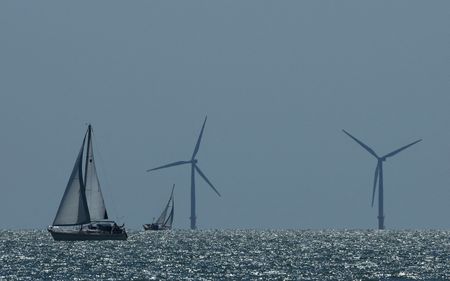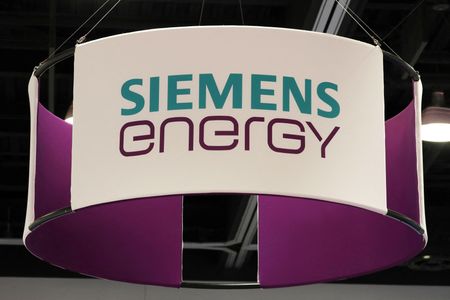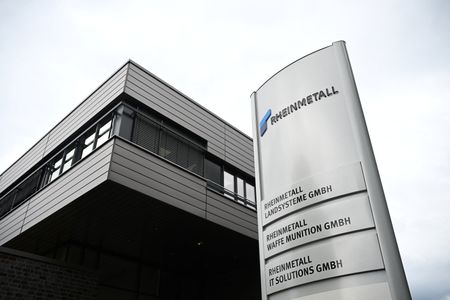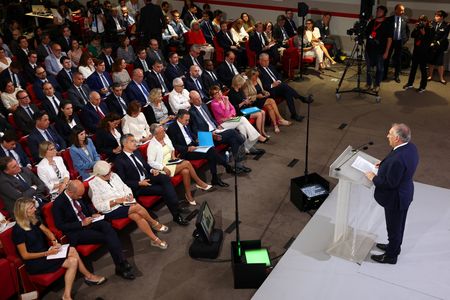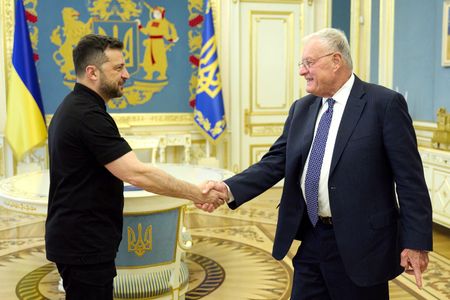By Riham Alkousaa and Sarah Marsh
BERLIN (Reuters) -A German company may scrap a deal with a Chinese firm to supply turbines for one of its North Sea offshore wind farms, it said on Monday, citing operational reasons, although it added improved security was “a positive side effect”.
China’s Ming Yang Smart Energy was due to provide turbines for the 300-megawatt Waterkant wind farm under a deal announced last year, but Hamburg-based asset manager Luxcara said it had instead reserved capacity for 19 Siemens Gamesa turbines, a subsidiary of Germany’s Siemens Energy.
It said it was considering the change to ensure operational efficiencies, given these were the same turbines it used for the neighbouring 1.5-gigawatt Waterekke project – its largest offshore wind project to date in the German North Sea.
The Ming Yang deal was announced after the European Commission last year launched a review of possible market distortions by Chinese wind turbine makers in five European Union countries, a move that China called “discriminatory”.
Luxcara told Reuters by email the political debate around the deal with Ming Yang Smart Energy did not play a decisive role in its considerations.
But “the fact that our approach is also compatible with political objectives and addresses issues relating to supply chains, technological dependency, and security aspects is a positive side effect,” it said.
The prospect of using Chinese-made turbines for the project drew scrutiny from Germany’s former economy minister and criticism from Europe’s wind turbine industry, which said the deal would give China access to critical infrastructure.
“The fact that Luxcara changed its mind before the government was forced to veto the deal is an optimal solution for (Chancellor Friedrich) Merz, who would have risked the ire of Beijing months before his first trip to China if he had blocked it,” said Noah Barkin, senior advisor at Rhodium Group’s China practice, in a LinkedIn post.
Merz is set to make his first visit to China towards the end of this year with a delegation of senior business executives, according to a person with direct knowledge of the matter.
The conservative chancellor has so far taken a tough public line on China, underscoring worries about China’s closeness to Russia and pledging to reduce Germany’s reliance on the world’s second largest economy.
A VIABLE EUROPEAN ALTERNATIVE?
In reality, Germany could struggle to reduce its dependency.
Siemens Gamesa has been beset by financial troubles in recent years, in part due to quality problems with its onshore wind turbines that led to project delays and heavy repair costs.
“It will be interesting to see whether the company can deliver on the Waterkant project. That would send a signal that European companies are a viable alternative to their increasingly dominant Chinese counterparts,” Barkin said
Luxcara said it had informed the relevant authorities and project partners about the possible switch in turbine supplier.
Siemens Gamesa confirmed the agreement but declined to give further details.
Ming Yang Smart Energy said in a statement it was no longer involved in the Waterkant project, but was still exploring opportunities in Germany.
“Ming Yang will continue to invest in technological innovation, strengthen local collaboration and explore opportunities to build a local production base,” it said.
Germany’s economy ministry said it does not usually comment on private companies’ decisions. It said the Federal Maritime and Hydrographic Agency will review the turbine planning during the ongoing planning approval process.
Waterkant, to be built in Germany’s North Sea, is scheduled to connect to the grid by the end of 2028 and is expected to generate enough power for about 400,000 households.
(Reporting by Riham Alkousaa and Sarah MarshEditing by Helen Popper and Barbara Lewis)

